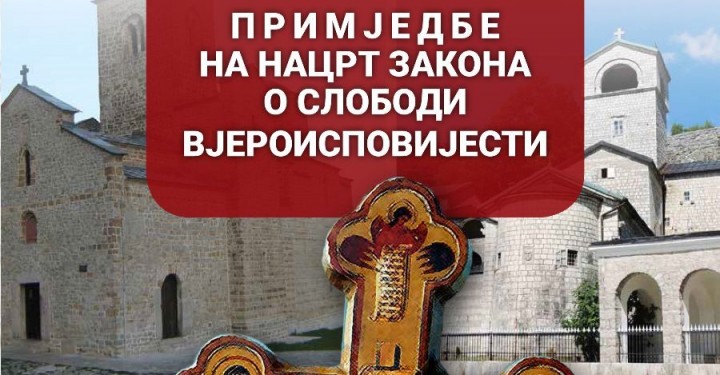Montenegro Accused of Threatening Religious Freedom
 A network of European religious liberties groups has criticised Montenegro’s draft law on religious freedom, alleging that it would violate the rights it says it intends to protect.
A network of European religious liberties groups has criticised Montenegro’s draft law on religious freedom, alleging that it would violate the rights it says it intends to protect.
The European Platform on Religious Intolerance and Discrimination, EPRID, has sharply criticised the proposed new law, saying that it would “seriously violate rights of religious freedom and autonomy for churches and religious communities and unfairly discriminate against them”.
It raised its concerns in a joint letter signed by Jewish Contribution to an Inclusive Europe, Association Internationale pour la Défense de la Liberté Religieuse, Christian Solidarity Worldwide, the Conference of European Churches, the European Evangelical Alliance, Global Human Rights Defence, Human Rights Without Frontiers, Open Doors International and the International Buddhist Information Bureau.
"We firmly believe that the current Draft Law on Freedom of Religion in Montenegro does not comply with European and international standards on human rights and freedom of religion or belief," the letter said.
The government proposed the law last July, explaining that the intention was to regulate religious freedom in accordance with EU standards.
Under the law, all the churches and monasteries built before 1918 would become state property and part of the country's cultural heritage.
Religious communities would also have to start to pay taxes, as well as to "confidentially inform the government" prior to appointing officials.
A public debate sparked fierce protests in last September, mostly from the Serbian Orthodox believers and priests. The Serbian Orthodox Church accused the government of seeking to discriminate against “the most populous religious community in Montenegro”.
The Islamic community and the Catholic Church were also unhappy about a number of proposed restrictions, and the government decided to postpone the adoption of the law to this year.
The EPRID network said freedom of religion would be limited by the new law because it would restrict who would be able to register and run religious communities in the country, and ban foreigners from establishing faith organizations.
"Those who do not have Montenegrin citizenship are excluded from the enjoyment of fundamental rights and freedoms in respect of religion [by the proposed law],” EPRID’s letter said.
“Only those organizations that have Montenegrin citizens, have no foreign references in their name and are headquartered in Montenegro enjoy those rights and freedoms. Other minorities do not. This constitutes a discriminatory act against foreign nationals and ethnic minorities," it alleged.
EPRID was particularly concerned over several provisions relating to religious education, which only would allow Montenegrin citizens to teach religion.
"If implemented, it would seriously undermine the autonomy of churches and religious communities in their operation and teaching. Those provisions would have the potential to undermine the right of churches and religious communities to autonomous government in such matters," the letter said.
Around 75 per cent of people in the country of some 650,000 are Orthodox Christians. In the last census, some 18 per cent declared themselves to be Muslims, while 3.5 per cent said they were Roman Catholics.
Source: BalkanInsight.com

